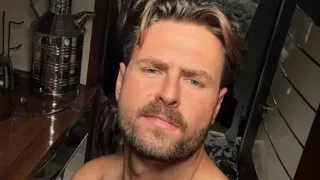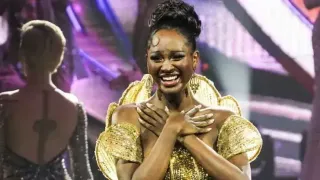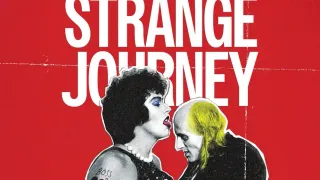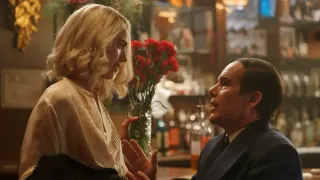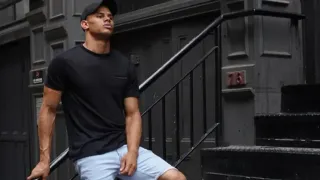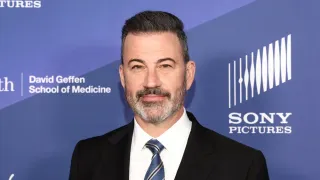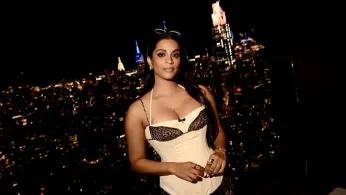
4 hours ago
Lilly Singh Champions Queer Sex Ed and Authenticity
READ TIME: 4 MIN.
Lilly Singh, known to millions as “Superwoman” and celebrated as one of the first openly bisexual women to host a late-night network show, has long been at the forefront of pushing boundaries in entertainment and advocacy. In a recent interview with Queerty, Singh opened up about her latest film “Doin’ It,” her personal struggles with discussing sexuality, and why comprehensive queer sex education is more critical than ever .
Singh describes “Doin’ It” as the film she wished she had growing up—a comedic yet deeply personal exploration of sex education through the lens of a queer woman of color. “Sex and my body was a very daunting subject,” Singh told Queerty. “I was always really uncomfortable talking about sex. Before this movie, I couldn’t even say ‘sex’ without whispering it. I never had the chance to talk openly, and if I did, it was always in a very heteronormative context. So this is like a love letter to young Lilly—the movie I wish I had growing up just to make me feel slightly more normal” .
The film centers on a sex-ed teacher—ironically, one with little experience herself—navigating a world of taboos, misinformation, and generational divides. Singh’s goal, she says, was to normalize conversations around sex, gender, and consent, using humor as an entry point for difficult but necessary discussions .
Lilly Singh’s advocacy for inclusive, LGBTQ+-affirming sex education is rooted in her own experience of feeling alienated by the limited and heteronormative curriculum she encountered in school. “I never had sex ed that included people like me,” Singh explained. “It was always about straight couples. There was no discussion of consent, boundaries, or even how to talk about feelings and identities beyond the binary” .
Research from organizations such as GLSEN underscores the importance of comprehensive sex education that reflects the realities of LGBTQ+ youth, who are often left out of mainstream curricula, leading to increased risks around health, safety, and well-being . Singh’s film, therefore, is not just entertainment but a pointed cultural intervention—one that invites audiences to laugh, learn, and question long-standing taboos.
In the interview, Singh also shared some of the unexpected challenges of bringing her vision to life—including working with puppeteers and Muppet characters. “It’s honestly terrifying sometimes,” Singh joked. “You’re having these really honest conversations with puppets, and yet it feels more real than most sex-ed classes I ever took” .
The use of Muppets in “Doin’ It” is both a playful nod to childhood education and a deliberate subversion of expectations. By blending innocence with frankness, Singh hopes to reduce the shame and anxiety that so often surrounds sexual topics—especially for queer and trans youth, who rarely see themselves represented in such spaces .
“Doin’ It” was not an easy film to make. Singh revealed that the project was independently financed and took over seven years to bring to fruition. “It’s not a big studio movie. I’m flying myself and my team to every press stop. I’m losing money on this, but it’s worth it because it’s for my purpose,” Singh told interviewer Angie Martinez .
Singh’s dedication reflects her broader commitment to creating space for LGBTQ+ stories in mainstream media, even when it means personal and financial sacrifice. This drive, she says, comes from her belief that authentic representation can change lives. “Progress gets hindered if you don’t showcase it,” she explained. “It’s about giving grace to yourself so you can give grace to others” .
Lilly Singh’s career has been defined by firsts: the first woman of color to host a major late-night network talk show, one of the earliest YouTube creators to break into traditional media, and now a filmmaker bringing queer stories to new audiences. Yet with these milestones came pressures and expectations. “All the headlines were like, ‘first woman, first woman of color,’ and for two years straight all I heard was people telling me what they expected of me. A billion Indians are counting on you. All the women are counting on you,” Singh reflected in an interview with Angie Martinez. “I just accepted all of that. But looking back, I wish I had given myself more grace” .
Singh now uses her platform to encourage others not to chase external validation, but to pursue authenticity and self-compassion—a message she also shared during a recent appearance on Jay Shetty’s podcast .
For many LGBTQ+ viewers, Singh’s work represents a long-overdue shift in how sex, identity, and joy are portrayed on screen. “I made this movie for my younger self,” Singh told Good Morning America. “Growing up, I never got to talk about these things. Sex ed was very limited, if it even existed at all. I always felt awkward around the subject. How lovely would it be to normalize this taboo subject with some comedy?” .
Singh’s advocacy is echoed by experts who argue that LGBTQ+-inclusive media and education not only foster acceptance but can have life-saving impacts, particularly for queer and trans youth facing isolation or erasure in more traditional environments .
As “Doin’ It” rolls out to audiences worldwide, Singh hopes it will spark both laughter and dialogue—especially in communities where conversations about sex and identity remain difficult or dangerous. “I hope people walk away feeling a little less alone, a little more seen, and a lot more willing to talk about things that matter,” Singh told Queerty .
Through her honesty, humor, and unwavering commitment to LGBTQ+ inclusion, Lilly Singh continues to expand what’s possible in entertainment—and in the hearts and minds of her audience.
